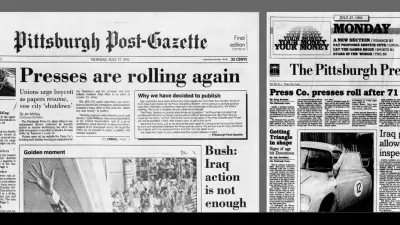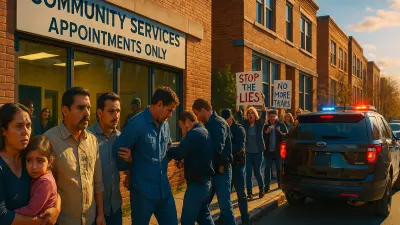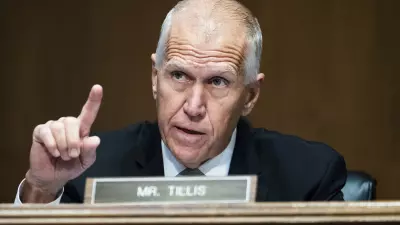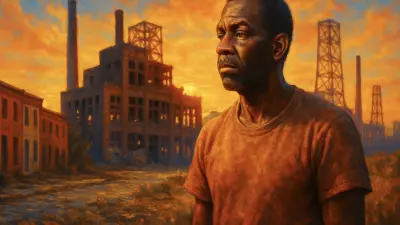Pittsburgh is now in the throes of a Post-Gazette newspaper strike so it’s a fitting moment to remember the late, great Pittsburgh Press and mourn my days in Western Pennsylvania.

Thirty years ago, another newspaper labor dispute roiled Pittsburgh. The Press, an afternoon daily with a Sunday edition, became the unfortunate victim of a strike and closed.
Some of the Press folks were able to latch on to jobs at the Post-Gazette. Others snagged jobs outside the city or at other outlets in the region. Some Press people never worked in news again.
I lucked out career-wise. I nailed a job at The News & Observer in Raleigh in 1993 and moved on to a dream career at CNN in Atlanta in 1997 until retirement a few years ago.
Despite the career moves, I am haunted by my choices. As a result, life is bittersweet on a personal level.
I am still despondent about the Press’s demise and even more embittered leaving Pittsburgh. I just can’t lose the taste of resentment.
People need to know that long after the presses stop, the reporters and editors and others who’ve lost their jobs have to find ways to feed their families, retain their morale, pursue their craft, and pray they’ve made the right choices. They have to grapple with the fact that they might need to leave home to get work.
I’m a Philadelphia native and when I first rolled into Pittsburgh to visit a college girlfriend in 1970 I knew right then and there that this is where I want to live. I loved the place and I fit right in.
Despite the career moves, I am haunted by my choices. As a result, life is bittersweet on a personal level.
I met my wife at my first gig in Weirton, W. Va. After working on a few newspaper dailies, I landed a job at the Press. That’s what I had my eye on. We’d live in the city and be near my wife’s family, some 40 miles away. Home sweet home sweet home.
The Press was a tough, gritty operation replete with gifted reporters and editors, many of whom were locals who knew the region up and down. An impressive bunch.
After a few years at other dailies, I truly learned the newspaper trade and its principles in the arduous and hard-knocks Press atmosphere, thanks to demanding editors.
But sometimes maybe the supervisors were too blunt and sometimes the working conditions could have been better. Enough of us thought so and we started a movement to organize the non-union Press newsroom.
That organizing effort failed and it was a risky move. Bosses don’t like unions. But I could look at myself in the mirror every morning and not feel shame. Backing out of a union drive goes against my grain.
Not long after that, the wheels were set in motion for the end of the Press.
A supervisor called me in May 1992 and said the Teamsters were on strike and we were to report to the newsroom. There was no paper to publish but we’ll get paid.
For the rest of the year, we trekked to the office but there were no deadlines. With the exception of a brief but failed effort to revive the paper, we had time on our hands. We read, we chatted and we worked on our writing and editing. I remember taking an in-house workshop on newspaper design.
Eventually we knew the Press wasn’t coming back and we started looking for jobs. We had time to craft resumes and contact prospective employers.
I sent out around 30 applications and I made inroads even though I was just one of the faceless troops in the trenches looking for work. I landed a few in-person interviews.

Knowing we were folding, the News & Observer came to town. It was one of a few operations that visited the newsroom and recruited journalists. The N&O turned out to be a perfect fit. I had a tryout there in late December and got a job offer in January. I started in February 1993.
My wife, our two children, and I drove south on a bitterly cold February day. We left our family and our friends. We left our synagogue. Our goodbye was unceremoniously cold and bitter. We got dumped in an every-man-for-himself atmosphere.
I remember a curt call from a PG employee the day after Thanksgiving. I didn’t know this guy and he didn’t know me. I had applied for a job at the PG. He said I didn’t make the cut. That knockout punch landed and I still feel it. They never took the time to meet and get to know me.
I recall the PG people coming down to the Press newsroom and handing out contract handbooks to the Press people who got jobs at the PG. They rubbed it in and maybe it would have been a more appropriate move to huddle with their new employees somewhere else.
I remember my last day in the office. Press editor Angus McEachran handed out severance checks. It was a morose day in the Christmas season for everyone, even for those of us who don’t observe.
Maybe the biggest slight was the Post-Gazette’s decision to readjust its branding to The Post-Gazette and Best of the Press. That was a loud and clear reminder that those of us who didn’t make the PG cut didn’t cut it. Another classy punch to the gut.
As it happens, Raleigh turned out to be a wonderful place personally and professionally, and after four years, we moved to Atlanta, where my son Daniel was on the high school football team.
After the demise of the Pittsburgh Press and after we Press people scattered, my wife and I concluded we made the right choices and landed safely. But on a personal level we took a wrong turn.
One day in 1999, during a high school football team retreat in north Georgia, he died. Let me repeat: Our son died. He succumbed less than two years after we arrived in Georgia.
I won’t and can’t go into the details of what happened.
But I wonder everyday whether he would still be with us if I made different moves.
Should I have tried harder for jobs at the PG, at local papers or at local TV stations? Should I have played it safe and skipped participation in the union drive? Should I have accepted my dream job in Atlanta?
Not long after the PG employee called me to tell me I didn’t make the cut, my son and I walked to a Y where he played in a basketball league.
Knowing I was down and broken, Dan psychically held me up as we walked to the court. He possessed good karma and had my back.
Dan spotted one of those green PG boxes during our walk and he kicked the damn thing. Then he pronounced his hatred for the PG. One symbolic knockout punch for our side.
We live our lives to honor our children and we try to do the right thing in Dan’s memory. Our working lives have been enriching and meaningful and our lives have been fulfilling. At the same time my wife and I are haunted, broken and bitter. We live in both of those worlds.
After the demise of the Pittsburgh Press and after we Press people scattered, my wife and I concluded we made the right choices and landed safely. But on a personal level we took a wrong turn.
That’s what I remember about the 1992 Pittsburgh newspaper strike.







